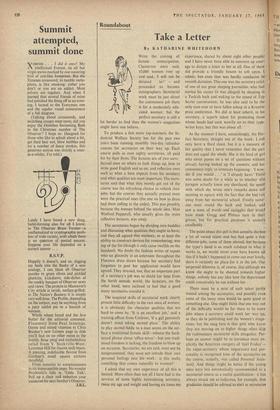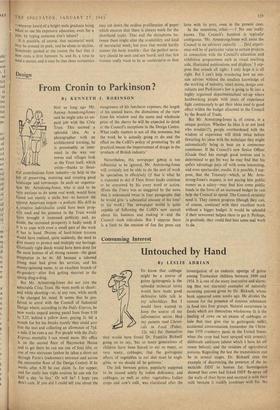Roundabout
Take a Letter
By KATHARINE WHITEHORN WITH the coming of • female emancipation, Chesterton once said, 10,000 women rose up and said,. 'I will not be
To produce a few more top-notchers, the In- dustrial Welfare Society has for the past two years been running monthly two-day refresher courses for secretaries on their way up. Each course pulls in over eighty secretaries, all paid for by their firms. The lectures are of two sorts : factual ones on where to look things up, how to write good English and so on; and reflective ones such as what a boss expects from his secretary and what qualities are most important. The secre- taries said that what they mostly got out of the course was the refreshing chance to rethink their jobs; but the courses they actually praised most were the practical ones (the one on how to dress had them rolling in the aisles). This was possibly because the woman behind the whole idea, Miss Winfred Pepperell, who usually gives the more reflective lectures, was away.
The secretaries began by dividing into huddles and discussing what qualities they ought to have; and they all agreed that memory, or at least the ability-to construct devices for remembering, was top of the list (though it only came twelfth on the handout). No doubt the fashion writer of repute who sat gloomily in an anteroom throughout the Florence dress shows because her secretary had forgotten to post her application would have agreed. They stressed, too, that an important part of a secretary's job was to shield her boss from the harsh outside world; the lecturers, on the other hand, were inclined to feel that a good many secretaries overdid it.
The acquired skills of secretarial work clearly present little difficulty to the vast mass of women; it is obviously the character qualities that are hard to come by. 'It is an excellent job,' said a training officer from Unilever, 'if a girl genuinely doesn't mind taking second place.' The ability to play second fiddle to a man seems on the sur- face a traditional female skill—witness the hack- neyed phrase about 'office wives'—but one tradi- tional freedom is lacking, the freedom to blow up on occasion. Secretaries, we are told, must not be temperamental, they must not intrude their own personal feelings into the work : is this really something that comes naturally to women?
I admit that my own experience of all this is limited. More often than not all I have had is the services of some highly intimidating secretary, twice my age and weight and having six times my experience, shared by about eight other people; and I have never been able to summon up cour- age to dictate a letter to her at all. One of these did provide a friendly bosom to sob upon, admit; but even that was hardly conducive to smooth dictation. This one was the secretary relict of one of our great sleeping journalists, who had started his career (it was alleged) by sleeping in a Turkish bath and waking to the sound of Top Secret conversation; he was also said to be the only man ever to have fallen asleep in a Kremlin press conference. We did at least inherit, in his secretary, a superb talent for protecting those whose heads had sunk wearily on to their type- writer keys; but that was about all.
At the moment I have, astonishingly, the Per- fect Secretary, straight out of the book; I still only have a third share, but it is a measure of her quality that I never remember that the part does not equal the whole. She is the kind of girl who never passes on a set of questions without already having looked up the answers; and her commonest reply to sentences beginning : `I won- der if you would . . .' is '1 already have.' There was some doubt for a while as to whether this paragon actually knew any shorthand, the speed with which she wrote one's remarks down not seeming to square with the fact that she had run away from her secretarial school. Finally some- one went round the back and looked, and saw a mass of words and squiggles that would have made Gregg and Pitman turn in their graves, but for practical purposes it answers excellently.
The point about this girl is that actually she has a lot of varied talent and has had quite a few different jobs, some of them abroad, but because the typer's hand is so much subdued to what it works in, we would never even have known all this if it hadn't happened to come out over lunch; there is certainly no place for it in the job. Our perpetual dilemma is, of course, that although we know she ought to be shunted towards higher things, nobody has any idea how the department could conceivably be run without her.
There must be a mint of such talent partly wasted among the secretaries; and possibly even some of the lousy ones would be quite good at something else. One might think that one way out of the difficulty would be for there to be more jobs where a secretary could work her way up, as they do in publishing and the women's maga- zines; but the snag here is that girls who know they are moving on to higher things often skip the rudimentary secretarial skills altogether. Per- haps an answer might be to introduce more ex- plicitly the American category of 'Girl Friday'— the super-secretary whose importance and per- sonality is recognised (one of the secretaries on the course, actually, was called Personal Assis- tant). And things might be better if the young ones were less automatically recommended to a secretarial course as a useful qualification : it has always struck me as ludicrous, for example, that graduates should be advised to start as secretaries
----whoever heard of a bright male graduate being asked to use his expensive education, even for a Year. by typing someone else's letters?
It is possible, of course, that secretarial work may be around its peak, and be about to decline. Somebody quoted at the course the fact that it now costs a firm between 5s. and 8s. a time to send a memo, and it may be that sheer economics may cut down the endless proliferation of paper which ensures that there is always work for the shorthand typist. That and the dictaphone be- tween them might alter the availability and kind of secretarial work; but even that would hardly answer the basic trouble : that the perfect secre- tary should be seen and not heard, and that few women really want to be as unobtrusive as that.











































 Previous page
Previous page